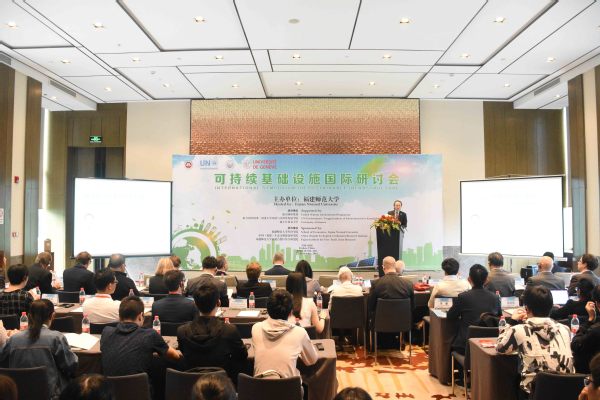
On October 22 to 23, the international symposium on sustainable infrastructure, hosted by FNU, co-sponsored by School of Economics, FNU and China (Fujian) Ecological Civilization Research Institute, and supported by the UN Environment Programme (UNEP), UNEP-Tongji Institute of Environment for Sustainable Development, and University of Geneva, was successfully held in Fuzhou. The symposium focused on infrastructure and the impact and paths of sustainable development goals (SDGs). Experts and scholars, from international organizations and well-known research institutions and universities at home and abroad, attended the conference, such as the UNEP, the United Nations Economic Commission for Europe (UNECE), the Organization for Economic Cooperation and Development, the Nature Conservancy (TNC), the German Development Cooperation Agency (GIZ), the Netherlands Environment Assessment Agency, the New Zealand Environment Protection Association, the World Wildlife Fund, the Institute for Global Environmental Strategies (IGES), the Asian Development Bank (ADB), Harvard University, Oxford University, University of Geneva, Minnesota State University, Deakin University, National University of Singapore, Delft University of Technology (Technische Universiteit Delft), Chinese Academy for Environmental Planning (CAEP), Policy Research Center for Environment and Economy, Ministry of Ecology and Environment of PRC, Center for Financial Research & Development of China Development Bank, the Export-Import Bank of China, Tongji University, Qingdao University of Technology. More than 100 people were present at the opening ceremony, including Vice President of FNU Lai Hairong, and staff and student representatives from School of Economics.
At the ceremony, on behalf of FNU, Vice-President Lai Hairong extended a warm welcome to the distinguished guests present. He briefly introduced the basic situation of FNU, and pointed out that in recent years, FNU has made full use of the unique advantages of Fujian being a national pilot zone for ecological civilization and a core area of the 21st Century Maritime Silk Road, actively conducted researches on major realistic and frontier issues in such fields as environment economy and ecological civilization, formed the research directions with characteristics, like environment competitiveness, low carbon economy competitiveness, theory and policy of ecological civilization, and produced a series of research achievements in environmental competitiveness, with great influence both at home and abroad. He hoped that the distinguished guests could carry out a broader and deeper cooperation with FNU and support its construction and development constantly. Sheng Fulai, senior economist of the UNEP Division of Economics, Matteo Tarantino, senior fellow of University of Geneva, and Sun Jie, director of UNEP-Tongji Institute of Environment for Sustainable Development, also addressed the opening ceremony.
The two-day international symposium is divided into six sessions: the opening ceremony, keynote speech, introductory speech, parallel discussion, workshop and closing outlook. Six major topics were dealt with at the symposium, namely, infrastructure and sustainable development goals, the definition of infrastructure coordination method, the implementation of infrastructure coordination method, green infrastructure management, green infrastructure construction projects of Global Environment Facility (GEF), and the future and challenges of green infrastructure. The following four issues were highlighted:basic link between infrastructure and the UN 2030 sustainable development goals; integration methods for infrastructure development, including strategies to integrate relevant tools, integration challenges and methods to cope with them; the acquisition of the key components of the model institutional arrangements adapted to the different situations in different countries; the GEF sustainable infrastructure investment projects proposed by the UNEP.
It is reported that through the workshop, the symposium has formed comprehensive research achievements, including the introduction about the projects funded by the UN Environment Fund, the combination of the financial system and infrastructure investment with sustainable development, ideas on how to implement the projects comprehensively and the analyzing tools useful to the required analyzing process.
Representatives from more than 10 news organizations, including Xinhua News Agency, China News Service, China Economic Herald, Fujian Daily and fjsen.com, attended the symposium and covered the event.
(Translated by Lv Yizhen, Reviewed by Xie Xiujuan)
